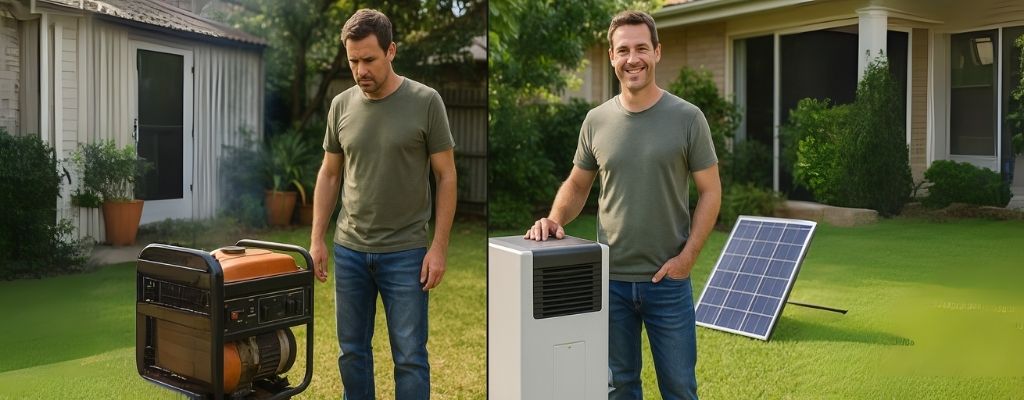
Are Generators Eco-Friendly?
Ever fired up a generator and wondered if Mother Nature winced? Short answer: most generators aren’t eco-friendly—but some are getting greener. From fuel types to solar hybrids, there’s a smarter way to power up. Keep reading to find out how to run your generator without choking the planet.

The Eco-Friendly Generator for Home
Generators are lifesavers when the power goes out—but they’re not always kind to the environment. Traditional models guzzle petrol or diesel, puffing out carbon dioxide, nitrogen oxides, and other pollutants.
They’re noisy too—like that neighbour who insists on mowing the lawn at 7am on a Sunday.
But not all generators are created equal. These days, you can get models that are quieter, cleaner, and much more fuel-efficient.
Some even hook into solar setups or battery systems to seriously cut down emissions.
If you're after reliable backup power that won’t turn your eco-conscience inside out, there are better options out there.

Reputable Brands for Your Green Generator
Not sure where to start? Here are a few brands doing good things in the eco-generator space:
-
SolarGen – Great for solar-diesel hybrid setups, ideal for rural Aussie properties
-
HybridPro – Combines solar and LPG, cutting down emissions while keeping power steady
-
GreenPower – Focused on solar-battery systems with solid performance
-
Yamaha and Honda – Their inverter models are fuel-efficient and quieter than a sleeping koala
-
Tesla Powerwall – Technically not a generator, but a battery system that works beautifully with solar
These brands are leading the charge when it comes to clean, reliable energy.

How to Choose the Right Model
Picking a "green" generator isn’t just about grabbing one with a pretty leaf logo. You’ve got to consider what it runs on, how it performs, and how it fits your lifestyle.
Solar Generators for Clean Power
Solar generators soak up the sun and store that energy in batteries, ready to go when you need it.
They’re whisper-quiet, emissions-free at point of use, and perfect for smaller loads like fridges, lights, and phone charging.
In Australia, they’re especially handy for off-grid cabins, caravans, or as blackout backup.
You’re not going to run your whole house with one (unless you’ve got a serious battery bank), but they’re a top pick for light-duty, eco-conscious power.
Inverter Generators for Efficiency
Inverter generators are the quiet achievers of the generator world.
They only work as hard as they need to—adjusting engine speed to match the load—so they burn less fuel and release fewer emissions.
Perfect for powering electronics or sensitive gear, they’re a favourite for tradies, campers, and small homes.
Plus, they won’t rattle your eardrums like old-school gennies.
Exploring Alternative Fuels
Not a fan of petrol fumes? You’ve got options.
LPG (liquid propane) burns cleaner and stores neatly in bottles. Natural gas is another clean-burning choice if you’ve got a steady supply.
Biofuels are gaining ground too—renewable and biodegradable, though still a bit harder to source in most places.
Switching fuels can make a real dent in your carbon output.

A Green Generator Company Guide
A truly green generator brand isn’t just selling cleaner power—it’s walking the talk.
Look for companies that source parts responsibly, minimise factory emissions, and offer take-back programs for old units.
Bonus points for those who publish real emissions data or have certifications from groups like CE or EPA.
Transparency is key here. If a company hides the details, it’s usually for a reason.
Assessing Your Needs and Maintenance
Before you buy anything, take a moment to think about how you’ll actually use your generator.
Is it for weekend camping? Emergency blackouts? Powering the pool pump at your off-grid shack?
Knowing your power needs will help you choose the most efficient and least wasteful setup.
And don’t forget maintenance. A clean air filter, fresh oil, and safe fuel storage go a long way toward keeping emissions low and performance high.
Going green with your power supply doesn’t mean giving up reliability.
Whether you choose a solar unit, a sleek inverter, or a clever hybrid, you can cut your carbon footprint without cutting power.
Small changes lead to big results—especially when the lights go out.
So think smart. Choose clean. And give Mother Nature one less thing to stress about.
You might also like:
-
What Happens If You Don't Ground a Generator?
- Where Are Generators Made?
- Who Repairs Generators?
- Should I Rent or Buy a Generator?
- What’s the Warranty on Most Generators?
- Are Refurbished Generators Worth Buying?
- What Are the Zoning Laws for Standby Generators?
- How Do I Prepare a Generator for a Hurricane?
- How Do Sand and Dust Affect Generators?
- What Insurance Considerations Are There for Generators?


